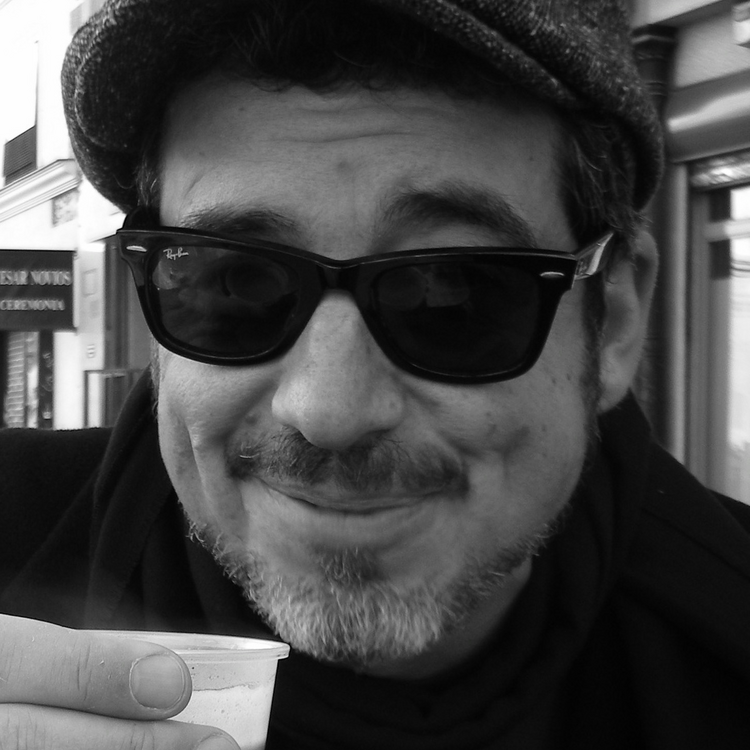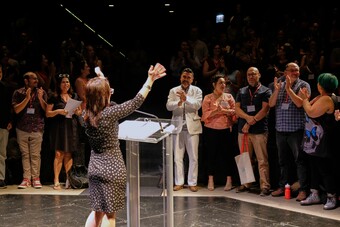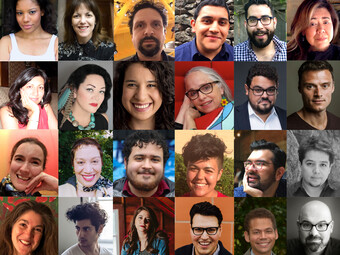My Theater Mecca On Lake Michigan
Teatro Vista
For an American playwright today, where is Mecca? Where does it all come together: actors of high quality who give maximum effort to a new script; directors with a sense of humor to match their ability to move bodies in space and make moments that signify on stage; audiences who not only love going to theater but do so a lot and make it part of their daily lives; and great bars before and after the show? Mecca (for me anyway) is Chicago. And my most recent hajj was to Teatro Vista.
I spent a single Sunday on pilgrimage in Chicago last month, thanks to Caridad Svich and the National 30/30 No Passport US Latina/o Play Festival’s Chicago line-up. My plane arrived around noon, and by 2p.m. I was happily out of the cold and into a booth at Mrs. Murphy and Son’s Irish Bistro. First up was a catch-up brunch after many years with Stephen Albert, executive director at the Court Theatre; he knew me when I first began my career at the Taper in the early nineties. After nearly thirty years in the business, I am not surprised but very grateful to see old friends. In the end, there are not a lot of us who keep doing theater. You have to be crazy or lucky, or both. And it has to give you joy. That really thins out the field.
By 4p.m. I had moved from the booth to the bar in order to meet Lavina Jadhwani, who would be directing the reading of my play Dark Matters later that evening for Vista. Full of life and laughter, experienced well beyond her years, already a name in the Chicago theater scene while still finishing her MFA at DePaul, Lavina was perhaps the main reason that I made the trip; good directors are the American theater’s most endangered species, and young directors can give a playwright a burst of youth. Sitting with Lavina, I could feel that she “got” the play in a way beyond the text, in a way that begins to deal with actions and reactions, and with the knowledge of unknown matter that we know is out there and that matters in our lives somehow—even when it can’t be fully identified. This is the world of Dark Matters, but it’s also something about the DNA of the best Chicago players, who somehow know without knowing that you only really understand the mysteries of a play by doing it full-throttle in an immediate present.
By 5p.m. we made our way through mid-twenty degree temperatures to our venue—the back room of a bar called Black Rock Pub and Kitchen. (If there seem to be a lot of bars in this essay, it has everything to do with Chicago, where the bars rock and the best folks congregate.) Here we met our Vista host and longtime ensemble member Juan Francisco Villa, and the actors – Gabriel Ruiz, Christina Nieves and Clayton Stamper, as well as Josh Nordmark, our cellist for the evening.
From this point on the Chicago pilgrimage really began to become an invocation. Working on a play in Chicago has something holy about it—but not a churchly kind of holy. Rather, it’s the blue-collar holiness of the working person doing his/her job with utter commitment, attention and presence. It’s human-holy, and precisely because it comes from the bodies and sweat of actors in space it has the chance to connect to the greater spirit: the mysterious, ephemeral reason we do what we do. (We all have our personal reasons to be in the theater, and they all connect when it’s going right.) It’s holy without pretense or self-consciousness, which makes it that much closer to godliness. This is not to say that such holiness does not sometimes occur at theaters in Portland, Hartford, New Orleans, Dallas, San Jose, or even in what is widely considered to be the playwright’s Mecca, New York. It is simply to say that the hajji (or pilgrim) dramatist can find in Chicago a oneness of purpose and play, art and engagement, politics and personality—not to mention the pleasure of fellow pilgrims along the journey—and in so doing be reminded why plays matter on a decidedly human scale.
The work happened and the performance occurred in the traditional manner—no extra bells or whistles, aside from the proximity to Guinness and French fries. But that is not quite true: that famous Chicago humor and edge was unmistakably present in Lavina’s direction, in the actors’ interchanges, even in the cello music. The actors came to work. Christina is smart and musical and beautiful. Gabe Ruiz is a powerhouse, resembling a Latino Hamish Linklater with his ruffled, gangly and hirsute good looks, not to mention his sharp intellect. And because it was Vista, there was that extra onda—that decidedly Chicago style of Chicanismo that comes from surviving sub-zero temperatures and the harsh winds off Lake Michigan on a daily basis—things we Southwestern and Coastal Chicano/as can only have nightmares about. Vista’s onda is the kind of familia that makes a body strong and generous to pilgrims from afar.
After the last line and the applause, the audience, the actors, and I pulled our chairs together and just talked; sure it was a post-play discussion, but it felt more like a bunch of fellow travelers considering where the play had taken them. Some were in the cosmos weighing W.I.M.P’s (weakly interactive massive particles) and the mysteries of dark matter, while others were on earth considering the future of the three lovers in the play and the electromagnetism that will not let them go.
Crazy as it sounds, after walking Gabe to his train near Wrigley Field (and at one point realizing that I could no longer feel my face from the wind), I hopped a cab back to the airport and a few hours later was on the first flight back home to summery Los Angeles and my USC MFA playwrights with their own highly distinct onda—truly a world away.
For this particular Mexican-American hajji, the trip reminded me why I write plays. It’s not about the money (there is none, usually) and it’s not about the glory. The act of worship deals with devotion—a combination of respect, love and dedication to doing the act and doing it right. There is piety in such actions, and lots of loyalty to one’s fellow artists. In the end, there is joy. Last month, I found it (again) in Chicago.






Comments
The article is just the start of the conversation—we want to know what you think about this subject, too! HowlRound is a space for knowledge-sharing, and we welcome spirited, thoughtful, and on-topic dialogue. Find our full comments policy here
Thank you for sharing the journey-quality of truly working together on a play. It's exciting as a young writer to know it's out there, and that I am working now on not only finding my plays, but my hajj city/home as a playwright.
Beautifully put, Oliver! We Angelino/as are so fortunate to have you in our midst.
Mayer vividly captures what it's like and why we love to work in Chicago.
What a great article. I don't think I've heard described so well the joy that comes from having loyalty to fellow artists. Loved the description of "the blue-collar holiness". Thanks for sharing your adventure.